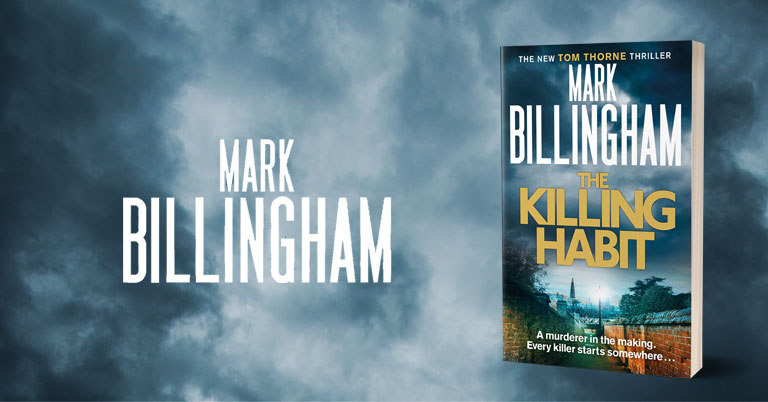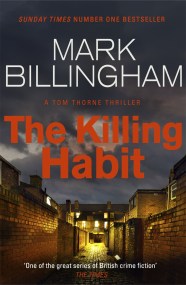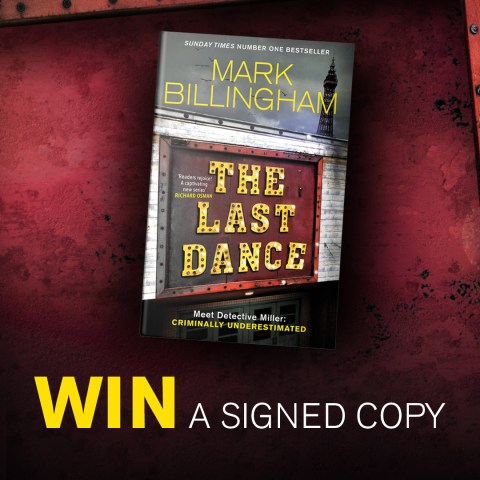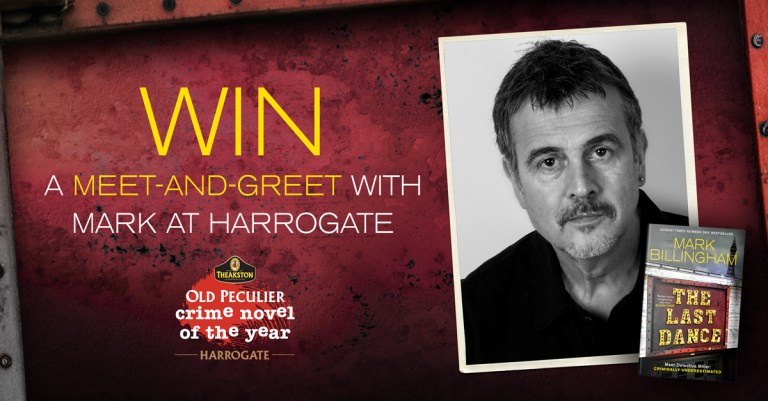An Extract from the Next Pulse-Pounding Tom Thorne Thriller

The Killing Habit
He was always amazed at how easy it was.
Part of that was down to him, of course, and it was no more than common sense; the thorough preparations, the thought he put into it. The care taken each and every time and the refusal to get lazy.
That was what they were after all. So trusting and desperate for affection.
Victims had never been hard to find, quite the opposite, but still, each night’s work needed to be treated with caution. Best laid plans and all that. There were basic measures that needed to be taken, things to steer clear of, cameras and that sort of carry-on. He was no expert when it came to forensics, but he knew enough to avoid leaving any sort of trace. The gloves were thicker than he would have liked, but that couldn’t be helped. It took away some of the feeling at the end, which was a shame, but he wasn’t going to risk getting scratched, was he?
Enough feeling, though. There was always enough, and each time it was as though things were starting to . . . even out inside him.
A lifting, of sorts.
Funny old word, but it sounded right.
He shook his head and drank his tea, one ear on the radio, as he sat and thought about who he was.
He knew there were some who would declare that this business of his was all about hate, but that kind of nonsense wasn’t even worth considering. It was never about that, never would be. Certainly not about sex, either, because that would be . . . ridiculous.
He smiled, shook his head, just thinking about it.
Did it really have to be about anything? Was it worth making a fuss about in the first place?
Not when you actually stopped to think, not if you sat down and put what he was doing into perspective. When there were bombs going off and plane crashes and kiddies getting cancer right left and centre, did pathetic creatures like these really matter? What was the point of them, anyway, in the scheme of things? At the end of the day, how many people were really going to miss them?
He turned off the radio and carried what was left of his tea out into the hall. He watched himself in the mirror while he downed it. He checked to make sure the front door was locked, then turned and walked back into the living room, such as it was.
He stopped and stretched, then rubbed a hand across his belly.
It felt like it was time to go looking again, not that he would need to look very hard, of course.
He decided that he might even treat himself to a new pair of gloves.
ONE
‘Cats?’ Thorne shook his head. ‘Are you serious? I mean they’re just . . . cats.’
DCI Russell Brigstocke gathered some papers on his desk and straightened them. ‘Yes, but there’s a good few of them. Fifteen more that we know about in the last ten weeks, and the press are all over it, demanding that something gets done. That we catch whoever’s responsible.’ A tone sounded from his mobile phone. He picked up the handset, swiped and stabbed, then laid it back down on the desk.
‘It’s a lot of dead cats, I get that.’ Thorne had followed the case in the papers and seen the coverage online and had known straightaway what Brigstocke had been talking about. ‘Obviously, people are upset, and I know you’re getting it in the neck from the Chief Superintendent, but surely there’s someone else who can handle it. For now, at least. I mean, we’re Homicide. We’re not . . .’
Brigstocke grinned. ‘Tomicide?’
Thorne smiled, in spite of himself.
‘See? You’ve even got the perfect name for it.’
‘Look, maybe whoever’s doing this just doesn’t like cats. Some people don’t. Think they’re a bit creepy.’
‘We have to take it seriously, Tom.’ Brigstocke sat back and ran fingers through hair that seemed to be getting greyer by the day. ‘I don’t have to spell it out, do I? Not for you.’
Thorne didn’t need to answer. He knew very well that he was fighting a losing battle; that fighting at all was no more than a reflex. A degree of bolshiness that was usually expected of him, especially this early in the week, still not quite up to speed after a weekend trying and failing to relax with his partner Helen and her overactive four year-old.
On top of which, he knew exactly what Brigstocke was talking about.
It had long been received wisdom that the corpse-littered career path of the common-or-garden serial killer – despite the fact that there was no such thing – more often than not began with the killing or torture of animals. Cats, dogs, birds. Together with fire-starting and persistent bedwetting beyond the age of five, it was one of the telltale traits that made up the so-called McDonald triad; a set of three behavioural characteristics suggested by an American psychiatrist in the early sixties that might help to identify nascent serial offenders. A common-or-garden copper, and there were plenty of those about, might be lucky, or unlucky enough, to come up against such an unusual killer once in a career.
Thorne had certainly dealt with more than his fair share.
He thought about a man who had suspended his victims in comas, incapable of movement and trapped, helpless within their own bodies.
He thought about a man who had targeted the children of those murdered many years earlier.
He thought about a man called Stuart Nicklin, who he had eventually seen convicted of the most depraved murders imaginable, but whose whereabouts were now unknown.
He thought about Stuart Nicklin a great deal.
Thorne let out a long breath. ‘So, you think there are going to be murders?’
‘There’s always murders, Tom.’ Brigstocke was beginning to sound a little irritated. ‘It’s what pays the mortgage, isn’t it?’
‘You know what I mean,’ Thorne said.
‘Well, we hope not, obviously, but we have to consider it a strong possibility. We need to be prepared for it.’ Brigstocke took off his glasses and began to clean them. The smile was icy, a warning. ‘So, why don’t you stop complaining and go and do your job?’
Thorne held out his arms, a picture of wronged innocence. ‘I’m raring to go, Russell. In fact, I’m already thinking that maybe we should try and trap whoever’s doing this. We could set bait.’
Brigstocke put his glasses back on and folded his arms. He said nothing, but his expression made it clear that he knew, more or less, what was coming.
‘It’s genius, now I come to think about it.’ Thorne got to his feet. ‘I know a great fancy dress shop where I could get the perfect outfit. Then all I need is a collar with a little bell on…’
Brigstocke shook his head and held out a piece of paper; waited until Thorne stepped across to take it. ‘Make sure you know what’s been happening. The SIO on it right now is based at Kentish Town, so when you’ve finished being a smartarse, get down there and introduce yourself, because I’ve already told him you’re coming. Your old stamping ground, isn’t it?’
Thorne winced a little at the ‘old’. He was still spending ninety-nine percent of his time with Helen and her son in Tulse Hill, but he was not entirely comfortable in south London and doubted he ever would be. He hated the daily commute to Hendon. He missed what he still thought of as his local pub and curry house. He missed running into fellow Spurs fans on match days. Yes, the living arrangements were ideal for his other half in terms of work and childcare, and the rental income on his old flat came in more than handy, but he still lived in hope that Helen would one day see sense and that the three of them could decamp to God’s side of the river.
‘Tom?’ Brigstocke had his phone to his ear, having already put a call through. ‘Anything else you want to give me a hard time about?’
Thorne shook his head and stepped away. He folded the piece of paper into the pocket of his leather jacket, lighter on his toes than he had been half an hour before. He felt excited suddenly, not just because of the back and forth with his boss and the welcome opportunity to pick up a takeaway from the Bengal Lancer, but because common-or-garden was not what got his blood jumping. Never had been. Because there was always the chance, slim but still compelling, that his cat-killer might just turn out to be something altogether more appalling.
He mumbled a ‘Sir’ as he walked to the door.
But he could not resist a murmured ‘miaow’ as he opened it.
The remark had been characteristically cynical, but Russell Brigstocke was telling the truth. It was murder that paid the mortgage, that brought Thorne and his colleagues into work every day. More often than not though, it was the humour, dark as all hell, that kept them there. Oiling a machine that was fuelled by violence and loss; the bad jokes and the banter that were necessary to quiet a brimming fury, or hold despair at bay.
It didn’t work for everyone, of course.
Thorne had spent the rest of the morning working through a backlog of paperwork, but by the time he returned from lunch, word of his latest assignment had clearly spread around the office and been gratefully seized upon. There were the predictable smirks on the faces of those walking past him and a few off-colour remarks about ‘pussy’. He casually raised two fingers at DI Yvonne Kitson, who he guessed was responsible for the can of Whiskas left on his desk. It became one finger when the ‘who, me?’ expression confirmed his suspicions. Had their roles been reversed, it was the kind of thing Thorne might have done himself, but he didn’t think he would be finding it funny for very long.
He read through the notes Brigstocke had given him and the email attachment that had quickly followed.
The details were suitably horrific.
Looking at what had been done to so many helpless and innocent animals, Thorne could only hope that, terrible as these killings were, they were not merely a curtain-raiser. That he wasn’t reading the early chapters of some trashy true-crime book waiting to happen.
He looked across at Yvonne Kitson and her smile died when she saw the expression on his face.
He ignored the grin from a pimply DC on a coffee-run.
If a killer this brutal decided that he was ready to expand his repertoire, he would not be the only one shifting gears. This machine in which Thorne was one tiny cog would need to race instead of merely turning over; flat-out and fast enough to do some damage.
Then, any number of jokes might not be enough.
'One of the great series of British crime fiction' The Times
From multi-million-copy number one bestseller Mark Billingham comes a twisting, unbearably gripping DI Tom Thorne and Nicola Tanner thriller inspired by a dramatic real-life case.
How do you catch a killer who is yet to kill?
We've all heard about the signs: coldness, cruelty, lack of empathy. DI Tom Thorne knows the psychological profile of a psychopath all too well, so when pets start disappearing on suburban London streets, he sees a chance to stop a future murderer.
Others are less convinced, so Thorne relies on DI Nicola Tanner to help him solve the case, before the culprit starts hunting people. The journey brings them face to face with a killer who will tear their lives apart.
----------
'A new Mark Billingham is always a treat and The Killing Habit hurls the reader straight into the action. Thoroughly enjoyable for being so very real' SUSIE STEINER
'Mark Billingham on superb form. A finely paced and polished procedural, with twists and turns galore and an ending that will chill your soul' CARA HUNTER
'An unconventional literary superstar' MAIL ON SUNDAY
'As ever with Billingham, a rich cast of characters and tense situations are marshalled with panache, leading to a final terrifying encounter' FINANCIAL TIMES
'Thorne is a terrific invention' IRISH INDEPENDENT
________________







